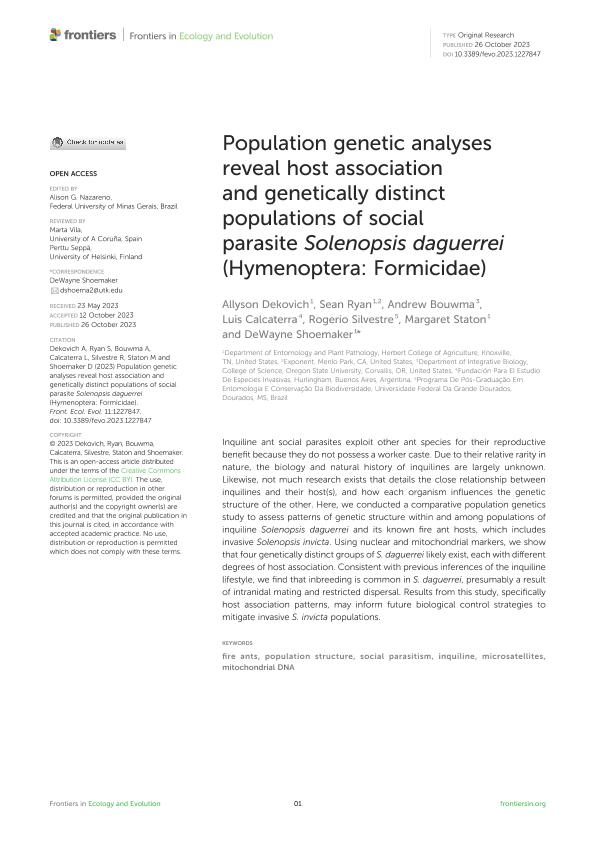Mostrar el registro sencillo del ítem
dc.contributor.author
Dekovich, Allyson
dc.contributor.author
Ryan, Sean
dc.contributor.author
Bouwma, Andrew
dc.contributor.author
Calcaterra, Luis Alberto

dc.contributor.author
Silvestre, Rogerio
dc.contributor.author
Staton, Margaret
dc.contributor.author
Shoemaker, DeWayne
dc.date.available
2023-12-14T19:52:15Z
dc.date.issued
2023-10
dc.identifier.citation
Dekovich, Allyson; Ryan, Sean; Bouwma, Andrew; Calcaterra, Luis Alberto; Silvestre, Rogerio; et al.; Population genetic analyses reveal host association and genetically distinct populations of social parasite Solenopsis daguerrei (Hymenoptera: Formicidae); Frontiers Media; Frontiers in Ecology and Evolution; 11; 10-2023; 1-17
dc.identifier.uri
http://hdl.handle.net/11336/220391
dc.description.abstract
Inquiline ant social parasites exploit other ant species for their reproductive benefit because they do not possess a worker caste. Due to their relative rarity in nature, the biology and natural history of inquilines are largely unknown. Likewise, not much research exists that details the close relationship between inquilines and their host(s), and how each organism influences the genetic structure of the other. Here, we conducted a comparative population genetics study to assess patterns of genetic structure within and among populations of inquiline Solenopsis daguerrei and its known fire ant hosts, which includes invasive Solenopsis invicta. Using nuclear and mitochondrial markers, we show that four genetically distinct groups of S. daguerrei likely exist, each with different degrees of host association. Consistent with previous inferences of the inquiline lifestyle, we find that inbreeding is common in S. daguerrei, presumably a result of intranidal mating and restricted dispersal. Results from this study, specifically host association patterns, may inform future biological control strategies to mitigate invasive S. invicta populations.
dc.format
application/pdf
dc.language.iso
eng
dc.publisher
Frontiers Media

dc.rights
info:eu-repo/semantics/openAccess
dc.rights.uri
https://creativecommons.org/licenses/by/2.5/ar/
dc.subject
FIRE ANTS
dc.subject
INQUILINE
dc.subject
MICROSATELLITES
dc.subject
MITOCHONDRIAL DNA
dc.subject
POPULATION STRUCTURE
dc.subject
SOCIAL PARASITISM
dc.subject.classification
Genética y Herencia

dc.subject.classification
Ciencias Biológicas

dc.subject.classification
CIENCIAS NATURALES Y EXACTAS

dc.title
Population genetic analyses reveal host association and genetically distinct populations of social parasite Solenopsis daguerrei (Hymenoptera: Formicidae)
dc.type
info:eu-repo/semantics/article
dc.type
info:ar-repo/semantics/artículo
dc.type
info:eu-repo/semantics/publishedVersion
dc.date.updated
2023-12-14T12:47:23Z
dc.identifier.eissn
2296-701X
dc.journal.volume
11
dc.journal.pagination
1-17
dc.journal.pais
Suiza

dc.description.fil
Fil: Dekovich, Allyson. Herbert College Of Agriculture; Estados Unidos
dc.description.fil
Fil: Ryan, Sean. Herbert College Of Agriculture; Estados Unidos. Exponent, Inc.; Estados Unidos
dc.description.fil
Fil: Bouwma, Andrew. State University of Oregon; Estados Unidos
dc.description.fil
Fil: Calcaterra, Luis Alberto. Consejo Nacional de Investigaciones Científicas y Técnicas; Argentina. Fundación para el Estudio de Especies Invasivas; Argentina
dc.description.fil
Fil: Silvestre, Rogerio. Universidade Federal Da Grande Dourados; Brasil
dc.description.fil
Fil: Staton, Margaret. Herbert College Of Agriculture; Estados Unidos
dc.description.fil
Fil: Shoemaker, DeWayne. Herbert College Of Agriculture; Estados Unidos
dc.journal.title
Frontiers in Ecology and Evolution
dc.relation.alternativeid
info:eu-repo/semantics/altIdentifier/url/https://www.frontiersin.org/articles/10.3389/fevo.2023.1227847/full
dc.relation.alternativeid
info:eu-repo/semantics/altIdentifier/doi/http://dx.doi.org/10.3389/fevo.2023.1227847
Archivos asociados
